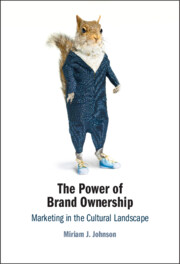Book contents
- The Power of Brand Ownership
- Reviews
- The Power of Brand Ownership
- Copyright page
- Dedication
- Contents
- Introduction
- 1 What We Mean When We Talk about the Cultural Landscape
- 2 Using Brands as Landmarks for Mapping the Cultural Landscape
- 3 Brand Capital, Perspective, and Power
- 4 The Role of Gender
- Case Study 1 Gender
- 5 The Importance of Authenticity
- 6 Brand Activism as a Power Dynamic
- Case Study 2 Activism
- 7 Ownership as Power
- 8 The Transience of Power in the Cultural Landscape
- Case Study 3 Shifting Power
- 9 TL;DR
- Works Cited
- Index
5 - The Importance of Authenticity
Published online by Cambridge University Press: 14 January 2025
- The Power of Brand Ownership
- Reviews
- The Power of Brand Ownership
- Copyright page
- Dedication
- Contents
- Introduction
- 1 What We Mean When We Talk about the Cultural Landscape
- 2 Using Brands as Landmarks for Mapping the Cultural Landscape
- 3 Brand Capital, Perspective, and Power
- 4 The Role of Gender
- Case Study 1 Gender
- 5 The Importance of Authenticity
- 6 Brand Activism as a Power Dynamic
- Case Study 2 Activism
- 7 Ownership as Power
- 8 The Transience of Power in the Cultural Landscape
- Case Study 3 Shifting Power
- 9 TL;DR
- Works Cited
- Index
Summary
This chapter considers the significance of authenticity in the context of branding and consumer behaviour. Authenticity is a complex construct that cannot be directly measured or calculated like other marketing metrics. It is particularly valued during times of change and uncertainty, serving not just as a unique selling proposition for brands but also as a means for consumers to align their choices with their self-identity and self-projection, underscoring the importance of consistency, conformity, and connection in understanding authenticity. These aspects not only help in defining what is ‘authentic’ but also demonstrate the strategic use of authenticity by brands to establish themselves as landmarks within the cultural landscape of consumers.
This chapter explores how perceived authenticity, influenced by a consumer’s narrative of self-identity and self-projection, aids in navigating the cultural landscape. This navigation involves using brands as landmarks to move closer to, or further from, consumers’ ‘authentic’ selves, thereby underscoring the crucial role that brand authenticity plays in consumers’ lives.
Keywords
- Type
- Chapter
- Information
- The Power of Brand OwnershipMarketing in the Cultural Landscape, pp. 93 - 109Publisher: Cambridge University PressPrint publication year: 2025

